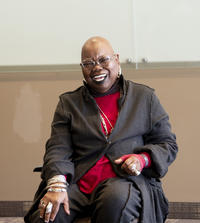 “The force of the human voice is unmatched.” On March 8 and 9, Grebel welcomed an extraordinary musician as the 2019 Rodney and Lorna Sawatsky Visiting Scholar, Dr. Ysaÿe M. Barnwell. Barnwell is a commissioned composer, arranger, author, actress, and former member of the African American female a cappella ensemble Sweet Honey In The Rock.®
“The force of the human voice is unmatched.” On March 8 and 9, Grebel welcomed an extraordinary musician as the 2019 Rodney and Lorna Sawatsky Visiting Scholar, Dr. Ysaÿe M. Barnwell. Barnwell is a commissioned composer, arranger, author, actress, and former member of the African American female a cappella ensemble Sweet Honey In The Rock.®
Her lecture focused on the power of music—particularly singing—to create inclusive communities. Rather than just explaining inclusion to us, she demonstrated it. Many in the audience were experienced singers—but not everyone was. How do you create an inclusive singing space when there are people of diverse singing abilities? You level the playing field. Barnwell did not begin by teaching us a four-part hymn; she began by teaching us a West African chant. The words were not in English and the melody did not move in simple steps. It felt uncomfortable to sing. She could hear that many of us were self-conscious and were not singing full-voice, so she said that if we felt like we were yodeling, then we were doing it right. And we all laughed and relaxed into the song.
As Barnwell shared about how singing together can create inclusive communities, I reflected on how it can also do just the opposite. Growing up in Mennonite congregations of Swiss and Russian origin, I learned early on that harmony singing was the mark of Mennonite worship and a point of pride. As a camper at Ontario Mennonite Music Camp, I remember the implicit message that good Mennonites are those who sing in perfect harmony. But not all Mennonite congregations sing 606 (“Praise God from whom), or even understand what that refers to. Not everyone who attends Mennonite churches grew up in a worship culture where they were taught to sing in parts. And I sometimes wonder if four-part singing becomes a way for us to create exclusive communities.
The ancient Greeks believed that music was powerful and could affect us deeply, and so it was important to use music wisely. Singing in harmony is powerful. It can unify us by creating something greater than any one of us, or it can divide us into “those who sing well” and “those who do not.” So, how can we use music wisely to build inclusive communities?







